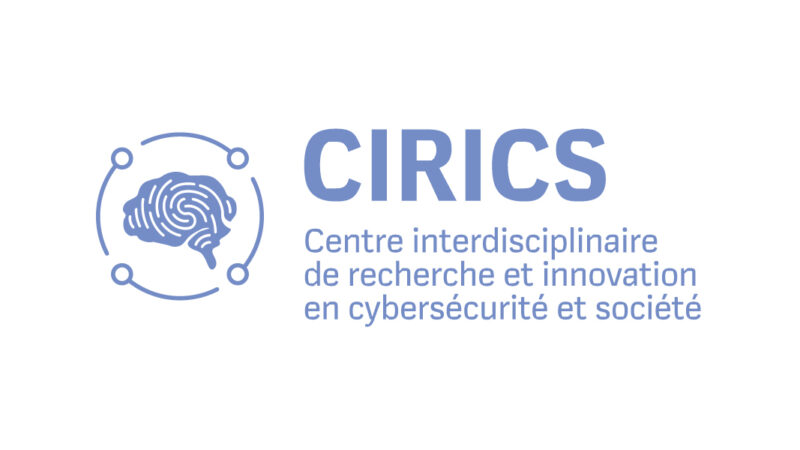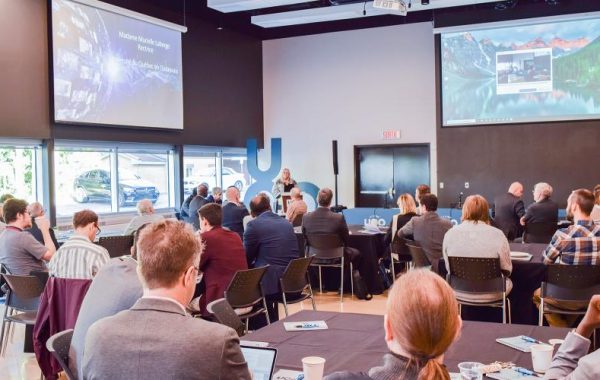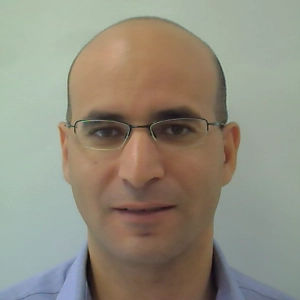
About us about us
A new research center, the Centre interdisciplinaire de recherche et d’innovation en cybersécurité et société (CIRICS), is being set up at the Université du Québec en Outaouais thanks to a research grant from the Direction des Grands Défis de Société of the Fonds de recherche du Québec (FRQ).
CIRICS, under the direction of Professor Patrice Renaud of the Department of Psychoeducation and Psychology, brings together 11 professors from four UQO departments. It brings together researchers from several fields, including cyberpsychology, business management and information technology. At CIRICS, scientific investigation is divided into two main areas:
- Cybersecurity and individuals, under the responsibility of Professor Renaud;
- Cybersecurity and Organizations, under the responsibility of Professor Stéphane Gagnon, Department of Administrative Sciences.
“UQO is committed to working with all those involved in cybersecurity and digital transformation in Quebec and Gatineau in particular,” says UQO Rector Murielle Laberge. We play a vital role in strengthening the skills and capabilities of individuals and organizations to derive maximum benefit from the digitization of our society.”
CIRICS researchers will make a significant contribution to understanding the human and organizational challenges of cybersecurity,” says Adel El Zaïm, Vice-Rector for Research, Creation, Partnerships and Internationalization. We have begun developing national and international partnerships, because cybersecurity is an issue that knows no borders.”

Interactions between digital technology, individuals and their organizations
CIRICS conducts multi- and trans-disciplinary research to shed light on the impact of cybersecurity in today’s and tomorrow’s digital society, on individuals and organizations in Quebec and around the world…
Beyond the cyberthreats we already know about, CIRICS is positioning itself to probe the ins and outs of what’s on the horizon and for which we need to be prepared. This approach is in line with the Quebec government’s cybersecurity policy, which aims to be proactive in the face of emerging threats.
As CIRICS’ research focuses specifically on the interactions between digital technologies, individuals and their organizations, computer science and engineering are present in both areas, on an ongoing and cross-disciplinary basis. It is by placing people at the center of cybersecurity and digital society issues that CIRICS sets itself apart as a scientific enterprise.
As Director of CIRICS and head of its Individual Component, my aim is to breathe new life into the field of cybersecurity research and innovation, setting it apart from prevailing conventional approaches,” says Patrice Renaud. In an era where artificial intelligence and metaverses rhyme with transhumanism, it is imperative to explore the reciprocal interaction between the human and the technological in order to formulate informed choices for what will come next. This can only be done by placing the human factor at the center of the equation.”
The launch of CIRICS at UQO represents a unique opportunity to strengthen our organizations in the face of cyber threats,” says Professor Stéphane Gagnon. Our role is to seek out new methods and strategies, as well as new system architectures, that best meet the challenges of privacy, information security and strategic cybersecurity. As the word “Innovation” is an integral part of the Centre’s name, our mandate is to ensure that our scientific research is closely aligned with the needs of organizations, who will be called upon to become partners in co-developing and transferring this knowledge. In addition, as we know, staff training in areas such as cybersecurity, artificial intelligence (AI) and business technology management (BTM) is an essential means of ensuring that our organizations are better prepared. CIRICS’ research is aimed at strengthening our programs, as well as supporting the companies that hire our graduates.”

Cyber attacks and cyber risk on the rise
The creation of CIRICS comes at a time when the digital transformation of society is accompanied by an increase in cyber-attacks and cyber-risk, making individuals as well as public and private organizations vulnerable.
Quebec society is now a digital society of excellence. According to NetendancesAccording to Netendances, “In 2022, apart from 5% of all Quebec adults, made up mainly of people aged 65 and over, every adult in Quebec will have one or other of the following three devices: computer (laptop or tabletop), tablet or smartphone. Since 2019, the percentage of adoption by Quebec adults of any of these three devices has risen from 59% in 2019 to 72% in 2022.”
Online transactions and purchases have also risen sharply. Thus, according to the same source, “In 2022, 75% of Quebec adults personally made at least one online purchase.” The same percentage of Quebec adults a year earlier (2021) “used the Internet to interact with the Quebec government, from its websites, whether to obtain information (72%), download official forms (33%) or send form(s) completed online (30%).”
In recent years, cybersecurity has emerged as one of the major societal challenges of the 21st century, affecting individuals, businesses and institutions in most connected societies like Quebec.
A recent Statistics Canada study points out that spending by Canadian companies “to detect or prevent cybersecurity incidents has increased by about $2.8 billion over 2019 to reach $9.7 billion in 2021”.
Researchers at the Université du Québec en Outaouais are devoting a number of research projects to various aspects of cybersecurity, in fields ranging from technology and data science to cyberpsychology.
Beyond the Digital Transition: The Challenge of the AI/RX Ecosystem
In an increasingly connected world, human error remains the main vector of vulnerability to cyber attacks. Nearly 95% of cybersecurity incidents are attributable to human error, underlining the need to reinforce training and security protocols. However, a significant shift in the threat landscape is expected.
The AI/RX ecosystem, combining artificial intelligence (AI) and extended reality (RX), is becoming a central player in various sectors such as education, healthcare and public safety. This ecosystem encompasses immersive technologies that enrich human interaction with augmented virtual experiences. The impact of these technologies is not limited to entertainment; they are also vectors of learning and operation in critical fields.
Extended reality alone has seen its market grow at a dizzying pace, estimated at 42.86 billion USD in 2021, with projections reaching 465.26 billion USD by 2027. This growth is propelled by increasing adoption within public and private organizations, signaling a deep integration of these tools into our social and economic fabric.
However, this integration brings with it new challenges in terms of cybersecurity. AI and RX, particularly in applications such as metaverses and the Internet of Things, increase the complexity of exchanges and multiply potential points of attack and destabilization.
Faced with these challenges, it is crucial to deepen our understanding of cyber actors’ behavior and strengthen defense strategies in this new ecosystem. Organizations must invest not only in advanced technologies, but also in the skills needed to anticipate and respond effectively to emerging cyber threats. The AI/RX ecosystem represents both a tremendous opportunity and a considerable challenge, perfectly illustrating the double-edged sword of the digital transition.
Visit Shutters
The field of cyberpsychology covers the study of the influences of information technologies (Internet, RX, social media, new connected equipment and robotics) on human behavior and society in general. This new branch of psychology, closely related to the study of human-machine interactions, focuses on the way in which technology users interact with technology in terms of their psychophysiological states, perceptions, beliefs, emotions and habits.
Cyberspace has recently undergone an accelerated transformation towards the metaverse, a more more immersive and more intuitive experience of cyberspace, thanks to its instinctive interfaces opening onto an infinite number of virtual worlds. These interfaces have the power to fade away, giving way to a more visceral and confounding user experience, even giving the frank illusion of being somewhere else, or even anywhere, or anyone.
Cybersecurity threats and incidents have a major impact on the management of organizations, affecting all hierarchical levels and requiring consideration in strategic and operational decisions. Senior managers, who are legally accountable in certain contexts, must guarantee cybersecurity and business continuity capabilities. Strand 2 addresses these imperatives, in line with Quebec government policies on digital transformation and AI integration. Our work also supports other government initiatives, such as L’Offensive de transformation numérique (OTN). Research advances will reinforce the government’s cybersecurity policy.
Organizations need to develop a resilient enterprise architecture, ensuring controlled risk management, secure transactions and a trusted environment for employees. Any IT innovation project for cybersecurity must integrate societal dimensions.
10 Projects
Team
News
Partners

Partner Name
Partner Description if any.

Partner Name
Partner Description if any.

Partner Name
Partner Description if any.

Partner Name
Partner Description if any.
Contact We
Join our newsletter
Center interdisciplinaire de recherche et innovation en cybersécurité et société
Université du Québec en Outaouais
Pavilion Lucien-Brault
101, rue Saint-Jean-Bosco
Gatineau (Québec) canada J8Y 3G5














